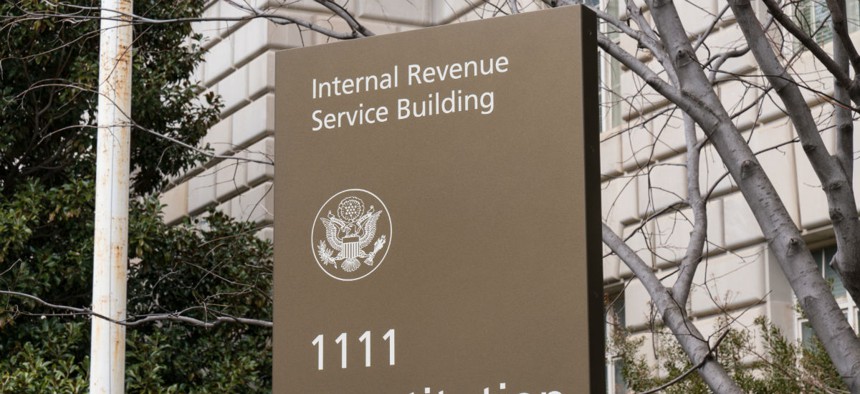Ways and Means Moves 12 IRS Reform Bills, Many With Technology Focus
Acting commissioner notes decline in identity theft, but seeks new funding.
With Tax Day looming on April 17, congressional Republicans last week continued their ongoing push to remake the Internal Revenue Service, with the House Ways and Means Committee clearing a dozen tax-related bills for possible floor action this week.
“The committee is taking the biggest and boldest step in 20 years to redesign this agency into a place with one singular mission: taxpayer service,” the panel said in a joint statement after the bipartisan vote on April 11.
“We’re laying out the guardrails and architecture of what a new IRS would look like and requiring them to bring back the [1998] restructuring plan,” added Chairman Rep. Kevin Brady, R-Texas, touting bills as remedies for long wait times at call centers, property seizure “abuse” and outdated information technology.
The Taxpayer First Act (H.R. 5444), for example, would create an independent appeals process to review taxpayer disputes. The 21st Century IRS Act (H.R. 5445) would augment the agency’s antiquated IT systems that include two of the government’s oldest, dating back to the 1960s, the committee reported.
“In the era of 5G and broadband internet, it’s still hard to imagine why the IRS continues to use technology our children wouldn’t be able to recognize,” said Oversight Subcommittee Chairman Lynn Jenkins, R-Kan. “That’s why we seek to eliminate fax machines and revamp the IT infrastructure so taxpayers have the peace of mind their most sensitive information is being responsibly protected by their government while using the technology they are used to.”
Another bill would require standardized use of electronic forms and e-signature tools.
Noting that the agency in 2017 received 242,000 reports of identity theft from taxpayers, the panel said the package of bills would strengthen the tax agency’s partnership with states and the private sector for combatting identify theft, create a single point of contact for victims, and “strengthen accountability for the billions of dollars spent on agency IT modernization efforts.”
The package of bills also would require more notice to taxpayers from the IRS when seizing assets and would permanently reauthorize the Free File and Volunteer Income Tax Assistance programs for low and moderate-income Americans. More broadly, the package would require the agency to give Congress a comprehensive plan on how to restructure the agency by September 2020.
The Ways and Means package was welcomed by Sen. Orrin Hatch, R-Utah, chairman of the Finance Committee, who said at his own committee hearing April 12, “the IRS stands at a crossroads. On the one hand, the IRS has made marked improvements in recent years, including catching more identity fraud, preventing more fraudulent returns, and moving forward to implement the multitude of tax law changes that have occurred, including the most comprehensive tax reform in a generation. But, on the other hand, it is an agency stuck in the past. It relies on software and core processing systems designed during the Kennedy Administration.”
Hatch added: “Mismanagement, taxpayer abuse, and discrimination against certain taxpayers are all too recent memories for those of us who oversee the agency.” He referred to “bad apples” among a workforce that is staffed by many of the government’s “most dedicated, hardest working civilians.”
Acting Commissioner David Kautter, who is also assistant Treasury secretary for tax policy, told senators that the incidence of identity theft among taxpayers had declined from 2015-2017, by as much as 65 percent, for example, as measured in identity theft affidavits submitted. “The IRS would need additional resources to ensure successful implementation of tax form” on top of the $320 million included in the March omnibus spending bill, he repeated. He promised updated implementation plans with two-year cost estimates.
The House package was welcomed by the National Association of Enrolled Agents, though its staff expressed hope that “the Senate will consider a number of issues to strengthen the legislation, including minimum standards for unenrolled tax preparers and procedures to strengthen the IRS budget process.”
The conservative National Taxpayers Union and Citizens Against Government Waste said the House committee’s “bipartisan effort is opening a new and vital chapter in the history of improving tax administration, Internal Revenue Service management, government efficiency, and taxpayer rights.”
The nonprofit Aspen Institute highlighted the package’s mandate for electronic filing of tax-exempt groups’ annual returns on form 990, which “coupled with the release of the forms as open, machine readable data, will benefit the public and the nonprofit sector, while strengthening tax administration and law enforcement,” it said.








